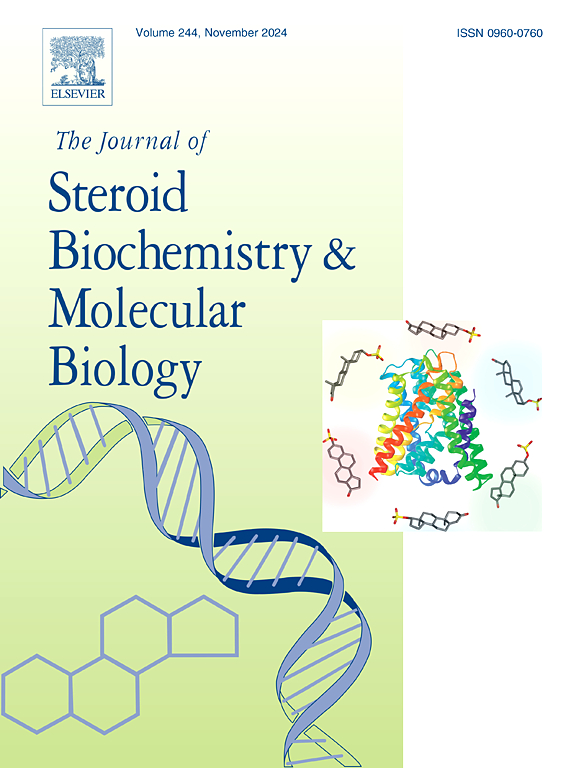Epigenetics’ responsibility in endometriosis: A comprehensive assessment
IF 2.5
2区 生物学
Q3 BIOCHEMISTRY & MOLECULAR BIOLOGY
Journal of Steroid Biochemistry and Molecular Biology
Pub Date : 2025-06-11
DOI:10.1016/j.jsbmb.2025.106814
引用次数: 0
Abstract
Endometriosis is a chronic inflammatory disease characterized by the presence of endometrial-like tissue outside the uterus, affecting women of reproductive age. Despite extensive research, its pathophysiology remains unclear, with genetic, hormonal, and environmental factors playing interconnected roles. Epigenetic processes, including non-coding RNAs, histone modifications, and DNA methylation, have been implicated in the genesis and progression of endometriosis. These modifications impact physiological functions such as inflammation, cell division, apoptosis, and hormone sensitivity. Recent findings on epigenetic alterations in endometriosis highlight their role in the abnormal behavior of ectopic endometrial-like cells. Aberrant DNA methylation patterns in genes related to immunological control and oestrogen metabolism contribute to the invasiveness and durability of lesions. Histone modifications, such as methylation and acetylation, regulate gene expression by altering chromatin structure. Non-coding RNAs, particularly microRNAs, influence tissue remodeling and inflammation. Given the reversible nature of epigenetic modifications, they present promising therapeutic targets for innovative treatment strategies. Epigenetic-based therapies aim to reverse pathological gene expression patterns, offering hope for more personalized and effective management of endometriosis. Further research is needed to fully utilize epigenetic processes in treating this debilitating disease.
表观遗传学在子宫内膜异位症中的作用:一项综合评估
子宫内膜异位症是一种慢性炎症性疾病,其特征是子宫外存在子宫内膜样组织,影响育龄妇女。尽管进行了广泛的研究,但其病理生理机制仍不清楚,遗传、激素和环境因素在其中起着相互关联的作用。表观遗传过程,包括非编码rna、组蛋白修饰和DNA甲基化,都与子宫内膜异位症的发生和发展有关。这些修饰影响生理功能,如炎症、细胞分裂、细胞凋亡和激素敏感性。最近关于子宫内膜异位症的表观遗传改变的研究结果强调了它们在异位子宫内膜样细胞异常行为中的作用。与免疫控制和雌激素代谢相关的基因中异常的DNA甲基化模式有助于病变的侵袭性和持久性。组蛋白修饰,如甲基化和乙酰化,通过改变染色质结构来调节基因表达。非编码rna,特别是microrna,影响组织重塑和炎症。鉴于表观遗传修饰的可逆性,它们为创新治疗策略提供了有希望的治疗靶点。基于表观遗传学的治疗旨在逆转病理基因表达模式,为更个性化和有效的子宫内膜异位症治疗提供了希望。需要进一步的研究来充分利用表观遗传过程来治疗这种使人衰弱的疾病。
本文章由计算机程序翻译,如有差异,请以英文原文为准。
求助全文
约1分钟内获得全文
求助全文
来源期刊
CiteScore
8.60
自引率
2.40%
发文量
113
审稿时长
46 days
期刊介绍:
The Journal of Steroid Biochemistry and Molecular Biology is devoted to new experimental and theoretical developments in areas related to steroids including vitamin D, lipids and their metabolomics. The Journal publishes a variety of contributions, including original articles, general and focused reviews, and rapid communications (brief articles of particular interest and clear novelty). Selected cutting-edge topics will be addressed in Special Issues managed by Guest Editors. Special Issues will contain both commissioned reviews and original research papers to provide comprehensive coverage of specific topics, and all submissions will undergo rigorous peer-review prior to publication.

 求助内容:
求助内容: 应助结果提醒方式:
应助结果提醒方式:


